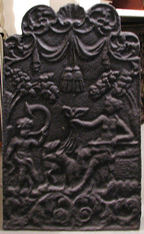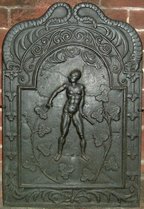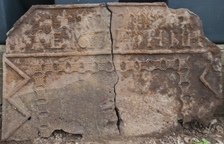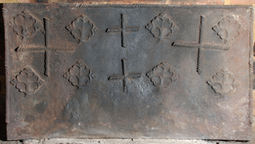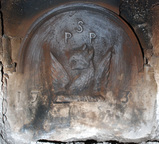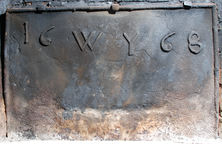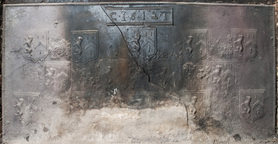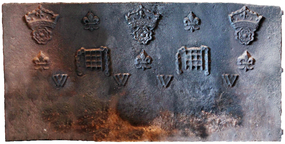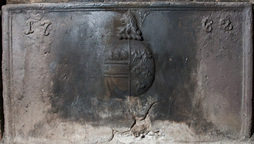-
868
Description: Rectangular with arched, mirrored scrolls on top and central scallop shell, below which are swagged drapes with a central tassel; fillet edging; in a grove, to the left a putto blowing a horn, to the right a semi-naked female figure seated, holding the tail of a fish, with two ?dogs at her feet; at the bottom, narrow panel with symmetrical scrolled foliate decoration.
Notes: Like others in the series, the scene is not immediately identifiable with a scene in classical mythology.
Copies of this fireback are known.
- Decoration tags:
- rectangular with ornate arch (shape)
- fillet (edging)
- whole carved pattern
- pictorial
- mythological
- animals
- humans
- plants
Manufactured: in the early-18th century in England.
Current location: Metropolitan Museum of Art, 1000, Fifth Avenue, New York, New York, United States of America.
Museum number: 08.81.6 (part of the Metropolitan Museum of Art, New York museum group)
- Attached to series:
- Late pictorial series (all)
- Late pictorial series 2
-
500
Description: Arched rectangular shaped central panel with astragal and fillet edge, pictorial, a bald, naked man, standing on a mound, holding a baton in his left hand, surrounded by leaf fronds to left and right, and clouds above; arched rectangular shaped border, fillet edging, hanging leaf clusters to left and right, swirled lines above, and draped foliage with monogram at base; on top are two serpents and draped foliage.
Notes: The figure may represent Pheidippides, the messenger between Athens and Sparta during the Battle of Marathon in 490BC.
Copies of this fireback are known.
Inscription: TAN
- Decoration tags:
- 'Dutch' (shape)
- fillet (edging)
- whole carved pattern
- pictorial
- mythological
- monogram
- text
- humans
Manufactured: in the early-18th century probably at Ashburnham Furnace in the Weald area of England.
Current location: West Berkshire Museum, Newbury, Berkshire, England.
Citation: Lloyd, N., 1925, 'Domestic Ironwork I', Architectural Review, 58, pp. 58-67.
- Attached to series:
- TAN series
- British 'Dutch' style firebacks
-
1314
Description: Canted rectangle; hatched fillet edging (top and sides); initials in triad to the left; fleur-de-lys stamp repeated seven times across top; date and initial pairs below; full width, horizontal hatched fillet below inscription; zig-zag formed of short, hatched fillets down each side below horizontal fillet; space within bordered by squared cross stamp repeated 12 times horizontally and six times on each side.
Notes: The distinctive squared cross and fleur stamps are seen on other firebacks; the initials in triad may relate to a husband and wife, the pairs of initials to their children; an almost identical fireback seen at Coombes in West Sussex (no. 1023) differs only in the alignment of the left-hand column of squared crosses. Unearthed close to the site of Elmbridge Furnace, at Newent, Gloucestershire.
Inscription: AHE [triad] 1671 WH MH
- Decoration tags:
- rectangular with canted top corners (shape)
- hatched fillet (edging)
- simple stamps
- carved stamps
- individual letters
- individual numbers
- heraldic
- text
- objects
Manufactured: in 1671 possibly at Elmbridge Furnace, Newent in the Forest of Dean area of England.
Current location: Smith's Funeral Services, Furnace Lane, Newent, Gloucestershire, England.
- Attached to series:
- Square cross Dean series 1
- Newent area group
- Fleur-de-lys firebacks
-
846
Description: Rectangular; twisted rope edging (top and sides); floriated trefoil stamp repeated in two rows of four in the upper two-thirds of the plate; between the middle four stamps, two small crosses of twisted rope, one above the other; between each outer group of four stamps a large cross of twisted rope.
Notes: The floriated trefoils may have been derived from a metal ornament.
- Decoration tags:
- rectangular (shape)
- rope (edging)
- simple stamps
- apotropaic
- objects
Manufactured: in the mid- to late-16th century in the Weald area of England.
Current location: in private hands, Barcombe, East Sussex, England.
- Attached to series:
- Miscellaneous stamp firebacks
- Metalware stamp firebacks
-
502
Description: Arched rectangular shape; embattled cavetto-moulded edging; shield, garter, supporters and crown of James I of England; a branch sprouting a rose and leaf to the left of the crown, a branch sprouting a thistle and leaf to the right; initials at top, split by crown; date below shield.
Notes: Similar in style to the 1619 series, this plate has larger rose and thistle plant stamps and was probably designed by the same pattern-maker
Copies of this fireback are known.
Inscription: I R / 16 21
Arms: English Stuart royal - James I
- Decoration tags:
- rectangular with round arch (shape)
- embattled cavetto (edging)
- whole carved pattern
- armorial
- royal
Manufactured: in 1621 in England.
Current location: Newick Park Hotel, Newick, East Sussex, England.
-
501
Description: Arched rectangular shape; ovolo-moulded edging; central crest of a gryphon's head couped, its wings displayed; above, the initials, the 'S' above the 'P's; below, the date.
Notes: The crest is likely to be that of Peter Short of Lindfield, Sussex, who married Philadelphia Burrell in 1704.
Inscription: PSP / 1730
Arms: Short of Lindfield
- Decoration tags:
- rectangular with round arch (shape)
- ovolo (edging)
- carved stamps
- individual letters
- individual numbers
- heraldic
- text
Manufactured: in 1730 possibly in the Weald area of England.
Current location: in private hands, Newick, East Sussex, England.
- Attached to series:
- Personal firebacks
- 1730s-40s, date & initial series
-
504
Description: Rectangular; twisted rope edging (top and sides); along upper half of plate, date split with initials in between.
Notes: The initials are likely to be those of William Yalden (d.1674), an ironmaster who was active in north-west Sussex and south-west Surrey where this and other similar firebacks have been noted.
Inscription: 16 WY 68
- Decoration tags:
- rectangular (shape)
- rope (edging)
- individual letters
- individual numbers
- text
Manufactured: in 1668 in the Weald area of England.
Current location: in private hands, Northchapel, West Sussex, England.
- Attached to series:
- William Yalden series
-
1316
Description: Rectangular; twisted rope edging on top and sides; cavetto-moulded-edged rectangle top centre (left side missing), enclosing date between initials; 14 shields of Ayloffe impaling Sulyard in three rows (5-4-5); Ayloffe: sable, a lion rampant Or, collared gules, between three crosses formy of the second; Sulyard: argent, a chevron gules between three pheons inverted sable.
Notes: William Ayloffe (c1535-1584) of Bretons, Hornchurch, Essex, Justice of the Court of Queen’s Bench, married (c1560) Jane, dau. of Sir Eustace Sulyard, of Runwell, Essex. The initials 'CT' are likely to be those of Charles Tyler, a founder whose working life and that of his family have strong parallels with the occurrence of these firebacks. The excrescences between some of the shields are the result of inexpert ladling of the iron during casting. The absence of the left side of the frame of the inscription panel has also been noted on another back in this series, also dated 1612.
Inscription: C.1.6.1.2.T
Arms: Ayloffe impaling Sulyard (William Ayloffe of Bretons, Hornchurch)
- Decoration tags:
- rectangular (shape)
- rope (edging)
- carved stamps
- individual letters
- individual numbers
- armorial
- text
Manufactured: in 1612 possibly at Bedgebury Furnace, Goudhurst in the Weald area of England.
Current location: Great Dixter, Northiam, East Sussex, England.
- Attached to series:
- Ayloffe series
- Personal armorial firebacks
-
1222
Description: Rectangular shape; no edging; symmetrical arrangement of four stamps: across the top, three crowned roses with a fleur-de-lys between each pair; across the middle, three fleurs-de-lys with a chained portcullis between each pair; below and in the spaces between the fleurs and portcullises, four letters W.
Notes: The letter W may have an apotropaic significance; the stamps have not been recorded on other firebacks.
Inscription: W W W W
- Decoration tags:
- rectangular (shape)
- none (edging)
- carved stamps
- heraldic
- apotropaic
- text
- objects
Manufactured: in the late-16th century possibly in the Weald area of England.
Current location: Great Dixter, Northiam, East Sussex, England.
- Attached to series:
- Miscellaneous royal firebacks
- Fleur-de-lys firebacks
-
1317
Description: Rectangular; cavetto-moulded edging (top and sides); date, in s florid style, split between top corners; central oval shield of impaled arms surmounted by a crest of a lion's head erased upon a wreath.
Notes: George Worge (1705-65), of Starr’s Green, Battle, sometime steward of the Battle Abbey estate, married Elizabeth (1707-66), eldest daughter of John Collier, town clerk of Hastings, in 1727. The arms of Worge have been variously blazoned, but most commonly they are: gules, a fess ermine cotised argent, in chief three lion’s heads erased of the last; Collier - argent, on a chevron azure, between three unicorns courant couped gules, as many oak sprigs fructed proper. The arms and crest in the same form can be seen on a fireback with an elaborate border (no. 757).
Inscription: 17 62
Arms: Worge impaling Collier (George and Elizabeth Worge)
- Decoration tags:
- rectangular (shape)
- cavetto (edging)
- carved stamps
- individual numbers
- heraldic
- armorial
- text
Manufactured: in 1762 probably at Robertsbridge Furnace, Salehurst in the Weald area of England.
Current location: Great Dixter, Northiam, East Sussex, England.
- Attached to series:
- Worge/Collier series
- Personal armorial firebacks
